#Napoleon: A Life by Adam Zamoyski
Text
Descriptions of Napoleon’s personality by Adam Zamoyski
“He was kind by nature, quick to assist and reward. He found comfortable jobs and granted generous pensions to former colleagues, teachers, and servants, even to a guard who had shown sympathy during his incarceration after the fall of Robespierre. He was generous to the son of Marbeuf, promoted his former commander at TouIon Dugommier and looked after his family when he died, did the same for La Poype and du Teil, and even found the useless Carteaux a post with a generous pension. Whenever he encountered hardship or poverty, he disbursed lavishly. He could be sensitive, and there are countless verifiable acts of solicitude and kindness that testify to his genuinely wishing to make people happy.”
“He was most at his ease with children, soldiers, servants, and those close to him, in whom he took a personal interest, asking them about their health, their families, and their troubles. He would treat them with a joshing familiarity, teasing them, calling them scoundrels or nincompoops; whenever he saw his physician, Dr. Jean-Nicolas Corvisart, he would ask him how many people he had killed that day.”
“He possessed considerable charm and only needed to smile for people to melt. He could be a delightful companion when he adopted an attitude of bonhomie. He was a good raconteur, and people loved listening to him speak on some subject that interested him, or tell his ghost stories, for which he would sometimes blow out the candles. He could grow passionate when discussing literature or, more rarely, his feelings.”

#source:#Napoleon: A Life by Adam Zamoyski#napoleon#Adam zamoyski#zamoyski#napoleonic era#napoleonic#Napoleon biography#bio#napoleon bonaparte#Dugommier#du Teil#La Poype#corvisart#Marbeuf#french revolution#frev#la révolution française#révolution française#first french empire#french empire#France#french history#history#19th century
70 notes
·
View notes
Text
I will leave it up to you how accurate you think the account of the mistress of Metternich is, but this passage about Alexander’s stay in London is so funny to me. I mean the English at this time were generally curious about foreigners but this is admittedly more intense
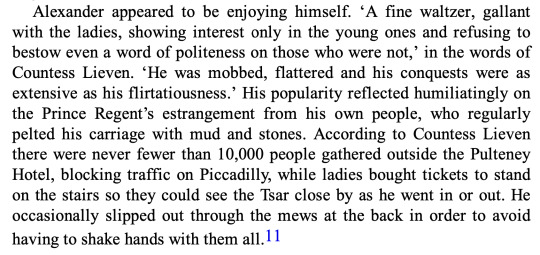
from “Rites of Peace: The Fall of Napoleon and the Congress of Vienna” by Adam Zamoisky
#alex was living that celebity idol life#tsar alexander i#alexander i of russia#dorothea lieven#napoleonic wars#adam zamoyski#just like another certain pole called Adam I would say he is more critical of Alexander in his book than most
25 notes
·
View notes
Note
19 and 20
19. Adam Zamoyski’s “Chopin: Prince of the Romantics” And I have the signed copy! 😚 I absolutely adore Chopin because I play the piano. The book is so well written, sometimes I forget that I’m reading about an actual real person. But some descriptions, the very gritty and depressing parts of his life, are so raw and emotionalllll gurlll I cried! 😭😭
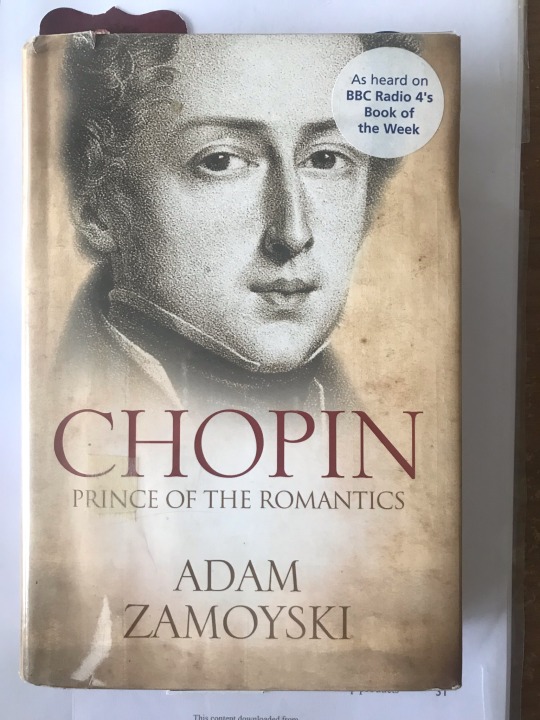
20. Uhmmmmmmm. I have sooo many. Prepare! 🤭💕
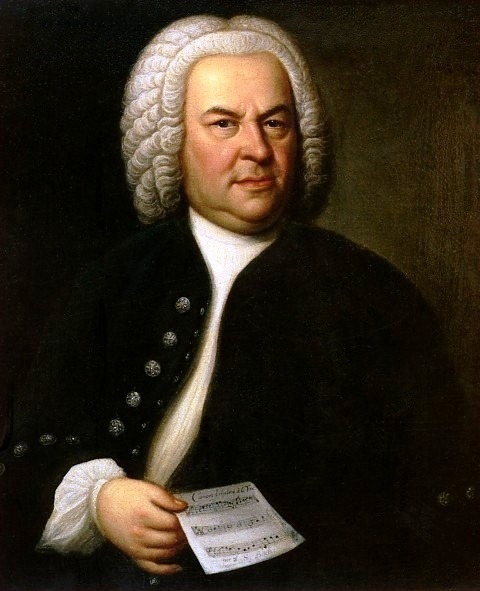
The one and only, Johann Sebastian Bach! He’s incredibly talented like omggggg how does he even come up with all these amazing pieces of music?!? 😨😳 His genius is unmatched. There will never be another composer like Bach! I have dozens of portraits and stickers of him and even a t-shirt. Omggggg it’s so embarrassing 🙈
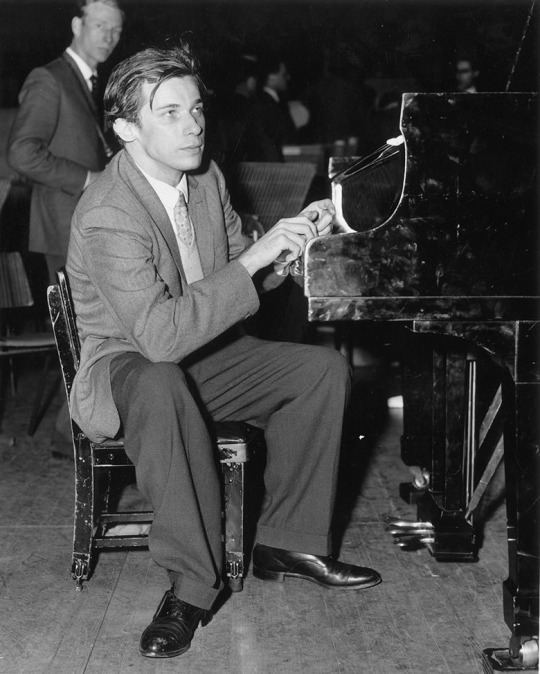
Glenn Gould, the quirky autistic Canadian Bach wizard! He’s so handsome even well into his older years. And he’s soooo eccentric, like you should read about some of his quirks, it’s really out there💀👀 Also, did I mention how talented he is?! He gets criticised a lot for his weird playing style and humming (sometimes singing) during his performances. I love it tho 😘 it really adds something to the records
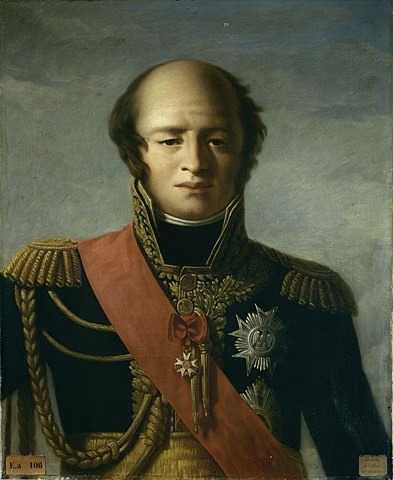
Louis👏Nicolas👏Davout👏 How can you not like this absolute beast of a man?! Sure, he was a bit rough with his soldiers, but I like a leader who doesn’t fuck around! We need more men like him! I feel for him though. He really was the least liked out of all Napoleon’s marshals, I relate to that because my fam doesn’t like me even though I’m a girl boss 👹 Poor old Davout was just doing his best! Here’s a quote that he wrote to Berthier —
“I cannot help admitting to myself that often my exactingness and my severity alienate good officers from me even before they barely have time to assess my true intentions."
Ommmgggg 😭😢
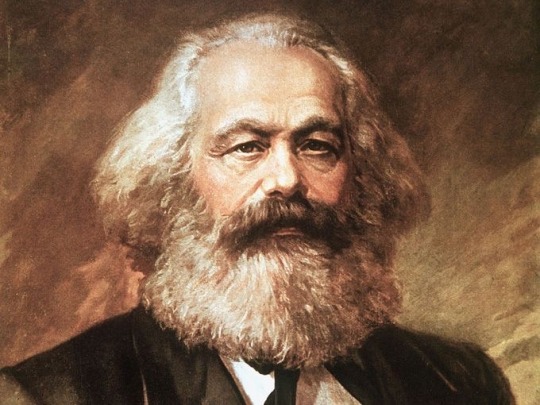
Ahemmm…. As a student I kinda have a love-hate relationship with this guy. I’ve suffered so many sleepless nights because of him 👩💻📚📚📚 But without this guy we’d probably still have our children working 16 hours for absolutely nothing (we still do actually, it’s heartbreaking). His works literally had soooo much impact on history, it’s unbelievable.
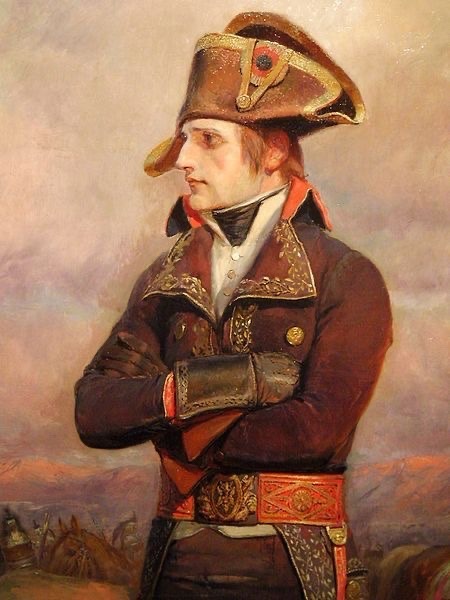
And of course, how can we forget our hero!?! I wanna be like him soooo much it aches 😫 My family genuinely don’t understand my obsession with this man, like how could they not?!! His image is literally on the wiki page for the “Great Man Theory” — that individuals with certain traits are able to affect the course of history rather than it being due to some larger force or something I dunno it’s an IR/history thing I’m studying 😢
18 notes
·
View notes
Text


I've been pretty deep in my Napoleonic phase lately and constantly obsessed on learning (discovering?) more about that era, I wanted to make some glossy prints on some of my favs with their official (?) portraits to see how it'll turn out. (ꈍᴗꈍ)♡ I'm actually pretty happy how they turned out and may print more for my own personal photo album.

Junot!! because he needs more love.
And Murat because he's my precious bb send help ❤️❤️❤️

Lannes 💗 Who doesn't love Lannes? so made two for Lannes, you go Jean Lannes!


something I totally didn't need but made bought a Lannes cup because why not. Mostly because I just really love this portrait of him by Julie Volpelière 🥺 currently making a Murat one as I write this
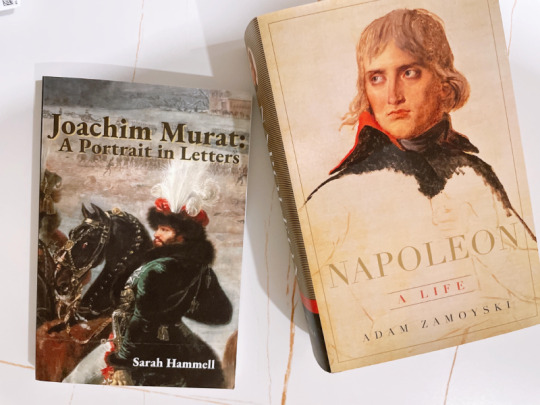
*BONUS* I recently bought these two books off Amazon to my collection!! Joachim Murat: A Portrait in Letters by @joachimnapoleon and Napoleon: A Life by Adam Zamoyski. Now I just got to find time to read since is school starting soon *cries*
#my wallet wasn't too badly damaged so yay#i may have overdone the use of purple and florals /shrug#bless picsart tbh#joachim murat#jean lannes#jean andoche junot#napoleon#napoleonic#personal rambles
35 notes
·
View notes
Text
hi friends :) today's rant is on feliks and ivan's late pre-soviet relationship and how i think it affects their perception of each other! because i think it's a massively unexplored dynamic!!
(disclaimer: i'm not a historian, these are the facts to the best of my recollection and understanding!! all excerpts are from adam zamoyski's poland, a history)
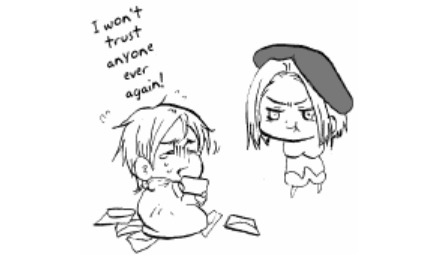
the decline of the commonwealth had been centuries in the making (because of its political system, but i won't bore you with the details haha). it all came down to the first partition of poland, quickly followed by the second and third. the last one entirely dissolved the commonwealth (and poland) as a sovereign state. but the beginning of the end was a while before that! the polish had been at the mercy of the russians under catherine the great, russian soldiers had been stationed to polish sejm (government) meetings and elections, and poland had practically become a puppet state with no independent actions of its own, even before it ceased to exist
i mentioned this in an ask, but i think of this as one of the hardest times in feliks' life. quoting myself, "unlike other difficult times in his life, he wasn't able to do anything about what was happening to him. he just had to watch as russians gained more and more control in his government until it was forced to dissolve, and i think that would've been harder on a restless person like feliks, because it's not something he could (try to) solve with a revolution. he pretty much spaced out through that entire time period."
and he had ivan always breathing down his shoulder, and his own government desperately trying to make peace with ivan's to no avail. one thing about Feliks: he's never been afraid of russia. not in the times before the partitions, and not in modern day, we've seen this in canon. i don't think he would've been afraid, but i think he would have been irritable. ivan was an itch under his skin that just wouldn't go away
the final partition wasn't so horrible at first. tsar alexander was somewhat sympathetic to the idea of polish reunification, and even reinstation:
Alexander's paramount position in 1814 permitted him to entertain hopes that he would be able to reunite most of the territory of the former Commonwealth in a kingdom under his own scepter […] but the Tsar's wishes were thwarted by Austria, Britain and France, which could not countenance Prussia being given swathes of Germany in compensation for those she would relinquish in Poland, nor indeed the huge westward expansion of Russian-dominated Poland. The re-establishment of a fully independent Poland was mooted by Britain and France but never seriously considered, and for all his good intentions Alexander would never have been able to sell the idea at home, where opinion reacted to his Polish plans with indignation.
despite russia's political control over the happenings in poland, i think ivan would have felt inferior to feliks or even afraid of him. keep in mind that we know ivan can be a very self-conscious character, especially about himself as a nation (less so about himself as a person). i think there are a few reasons that he would feel uncomfortable around feliks
1) the commonwealth had been extremely prosperous culturally and especially academically - much more than russia
There existed the fear that Poland would act as a springboard for the liberalisation of Russia or that Russia would gradually swallow up and digest its small satellite. At first, the former seemed the most likely. Large sections of Russian society had come under foreign influence as a result of the Napoleonic wars and appeared open to change. As a consequence of absorbing so much Polish territory, by 1815 no less than 64 per cent of nobility of the Romanov realm was of Polish descent, and since there were more literate Poles than Russians, more people within it could read and write Polish than Russian. The third largest city, Wilno, was entirely Polish in character and its university was the best in the Empire.
2) before but especially after tsar alexander's death, the polish made it their life's cause to fight russia (or really, anyone)
Countless other exploits earned [the Polish] the respect of enemies, from the Peninsula, […] to the depths of Russia, where General Colbert of the Guard Cavalry ordered all French units to borrow the capes and caps of Polish lancers before going on picket duty, to keep Cossacks at a respectful distance.
Wherever there were Russians, Prussians, Austrians or their allies to be fought, there were Poles in the ranks.
feliks could FINALLY do something about his predicament. and he made sure he was a thorn in ivan's side. he even managed some small wins that i never see people talk about, like a partial reinstation of poland:
In the end, a Kingdom of Poland consisting of 127,000 square kilometres with a population of 3.3 million was carved out of all three partitions. In addition, Kraków and a tiny area around the city was turned into a republic. The Tsar of Russia was the King of Poland, and all three partitioning powers were the protectors of the Republic of Kraków.
he took any chance to help others fight against him, but he also tried revolution after revolution!
On January 25 1831 Poland burnt its bridges by voting the dethronement of Nicholas as King of Poland. The Kingdom of Poland had seceded from Russia.
In February a force of 115,000 Russian troops marched into Poland. The Polish army, consisting of 30,000 men, blocked his advance successfully at Grochów on 25 February. […] The Poles were well set to win the campaign. They called up reserves of 80,000, and with the Lithuanian and other contingents, they could count up to 200,000 in total. The Russian forces in Poland numbered some 250,000, but the Polish soldier was more motivated.
even after this revolution failed, he didn't give up; he was always on the move, planning on ways to get his country back. the centralizacja was a revolutionary movement based at versailles with connections to similar movements in other countries, like italy, and france. after the centralizacja was discovered and destroyed, despite the mass deportations, execution orders, and other punishments instilled by the russians in an attempt to stop the polish, they were back at it. under ivan's nose, the central national committee of poland had an:
…intelligence department had men in every branch of the Russian army and civil service. The fighters trained and operated clandestinely in Warsaw under the noses of the Russian army encamped not only in the Citadel but in the squares and streets. The Russian General Berg, who had been instructed by the Grand Duke Constantine to investigate the conspiracy, reported back after some weeks that he had discovered 'only one thing, namely that I don't belong to it'. As an afterthought, he added: 'And neither does Your Imperial Highness.'
I think feliks, especially with his position, would've been a very active member in any intelligence activity! i'm sure he suffered terrible consequences for it, just like how i'm sure he just got back up and tried again. i think the description of him as a "phoenix" is more than accurate, not just for returning to statehood after the partitions, but because of all the times he fought to get it, was completely defeated, and returned to the cause immediately with a smile on his face. and Ivan couldn't stand it. i won't go into detail about the empire's harsh punishment of ex-commonwealth territories, but ivan, as a person, needs to be in control. needs to be listened to, obeyed, feared. feliks, in all of his quirk and impossibilities, refused to do that
ivan at the time (or really, for a lot of his history) badly wanted to be a part of the european sphere. feliks' very existence was a dent in those plans, because in every revolution, all nations were by his side, further ruining russia's image in europe
World opinion was strongly pro-Polish, and while newspapers ranted against Russian injustice, young men flocked to Poland, from Ireland, England, France, Germany, and, most of all, Italy.
to his dismay and anger, this included some of the other ex-commonwealth countries. i love the wording here, so i'll let the paragraph speak for itself:
[During the revolution] it had been said that the boundaries of the putative future Poland would draw themselves with the blood of insurgents. Predictably, they did not stretch very far into Ukraine, where only groups of Polish szlachta came out. In Belorussia, they included much of the old Commonwealth, with not only the peasants, but also the Jews of towns such as Pińsk joining the cause. In Lithuania and even southern Livonia, they corresponded to the borders of 1772, with mass participation by all classes. It was a slap in the face to the Russian policy carried on in these areas since the first partition.
despite the ex-commonwealth existing under multiple powers, russia was solidified as the polish people's arch-enemy. national and political consciousness within poland all surrounded the idea of the reinstation of the polish state and the fight against the suppressor - most notably, russia.
One of the most influential poets of the era, Zygmunt Krasiński, explained the Russian system in a letter to Pope Pius IX as 'a huge merciless machine, working by night and by day, crushing thousands of hearts and minds every minute… the irreconcilable enemy of all spiritual independence.'
within a hundred years, before any idea of sovietness, ivan had managed to establish himself as feliks' greatest enemy, in what felt like a relentless game of cat and mouse, and feliks had established himself as someone to watch out for. it reminds me of one of the few interactions they have in canon:
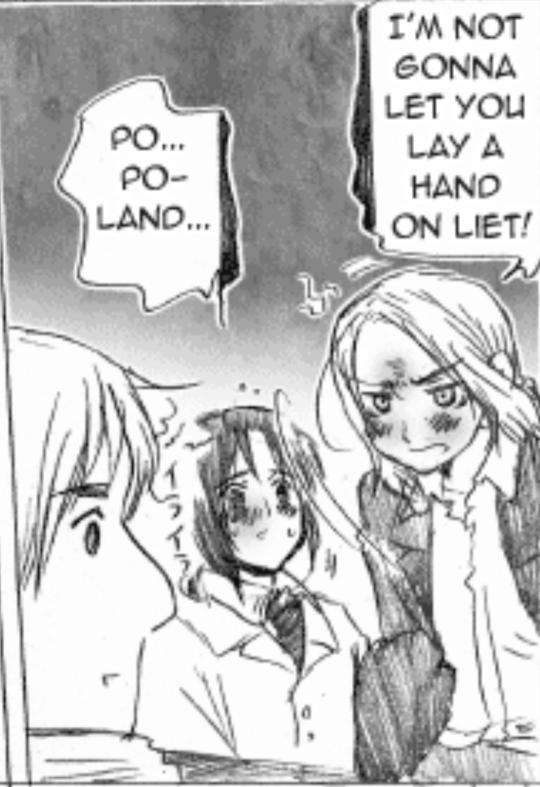
i love this panel to BITS because it's, i think, the angriest we ever see feliks. i don't think it's said exactly when this takes place, but fairly soon after lithuania's independence. feliks himself had been under soviet influence until about the same time, but despite the harshness of the decades, you can see his lack of fear to go against russia. because despite all that was done to him, it never existed (or maybe, feliks had the bravery to push through it, then for his people, and now for his best friend). and that's how feliks and his relationship with ivan stands out from his relationship with other nations, and why i think it's so fun to explore!
#THIS IS SO LONG if anyone reads this they get an award :)#but im glad i wrote it it helped me get my own thoughts in order!!#hws poland#hws russia#maia talks#character analysis
43 notes
·
View notes
Note
Hi there! I've been very interested with Napoleon & his marshals as of late, and when I saw your blog I thought it was a good place to ask about it :) Do you have any Napoleon biographies with reliable source? Oh, and also any good biographies on the marshals? Many thanks! 💛
Hello! I'll try to help as much as I can.
The only Napoleon biographies I've read (so far) are:
-Napoleon: A Life, by Andrew Roberts
-Napoleon: A Life, by Adam Zamoyski
-Napoleon Bonaparte: An Intimiate Biography, by Vincent Cronin
-Napoleon: Soldier of Destiny//Spirit of the Age 1805-1810//Decline and Fall of an Empire: 1811-1821; a three-volume biography by Michael Broers
So there are still quite a few prominent ones I need to read--and I haven't even attempted to read any of the French ones. But out of the ones I've read, I'd most recommend Cronin and Roberts. Cronin gives a great, humanizing portrait of Napoleon, and Andrew Roberts' book is very nicely balanced and well researched in my opinion. Both are pretty thorough with their sourcing. Cronin's also has a great appendix regarding the reliability of various Napoleonic memoirs. As much as I like Broers' political analyses in his books, he isn't as careful with his fact-checking and I admit I kind of soured on him a bit with the last book.
As far as biographies on the marshals, I have not read many. My primary focus for the past few years has been on Murat. In English, I would not say that there is currently a "definitive" biography on him, though a new English one is currently in the works for which I have very high hopes. But currently the only English biographies on Murat are A. Hilliard Atteridge's Joachim Murat: Marshal of France and King of Naples (1911), and The Betrayers by Hubert Cole, which is a dual biography of both Joachim and Caroline Murat, published in 1972. Both have their strengths and weaknesses. Atteridge's book goes into much more detail about Murat's early military career, and about the military campaigns in general. Cole kind of just breezes through Murat's early years and keeps the campaign descriptions fairly brief (which I'm honestly okay with; I find deep analyses of military tactics extremely boring if I'm being honest). Cole's strength, though, is in the number of primary sources he utilizes, and his excellent bibliography has been a goldmine for me in my own research. He also fleshes out Murat's reign in Naples in much better detail than Atteridge. Cole had far more access to Murat's correspondence than Atteridge did--as well as to many memoirs and archives--so Murat's story just feels far more fleshed out in Cole's book. I will add though that Cole, despite the title of the book, is actually very sympathetic to the Murats, and clearly not a fan of Napoleon.
For Marshal Lannes, I'd be remiss if I didn't recommend our own @maggiec70's marvelous work, The Emperor's Friend: Marshal Jean Lannes.
For the other marshals, I have all of these but the one on Davout, but I have not yet gotten around to reading them:
-Ney: Marshal Ney, The Bravest of the Brave, also by A. Hilliard Atteridge (1914), Marshal Ney: The Romance and the Real, by Raymond Horricks (1982), alternately titled for the newer edition Military Politics; From Bonaparte to the Bourbons: The Life and Death of Michel Ney 1769-1825 (1995)
-Berthier: By Command of the Emperor: A Life of Marshal Berthier, by S.J. Watson (1988)
-Davout: The Iron Marshal: A Biography of Louis N. Davout, by John G. Gallaher (2018)
-Soult: Napoleon's Maligned Marshal, by Sir Peter Hayman, (1990)
I hope that helps! Thanks for the ask :)
35 notes
·
View notes
Text
Book Review
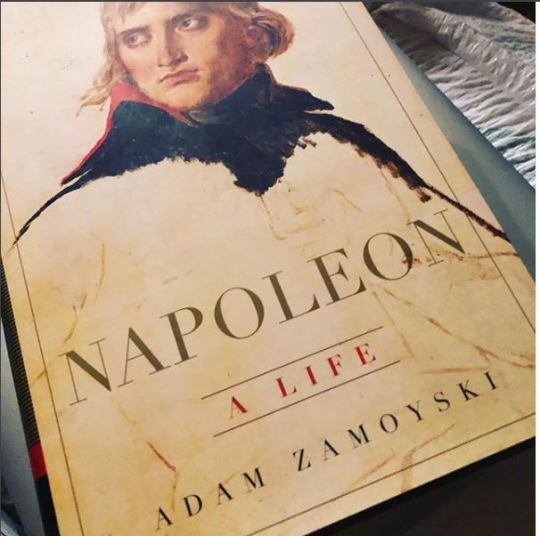
So I guess I am going to start a new thing....book reviews here and there. I don’t plan on going into great details, I don’t think, but feel free to reach out if you want to engage in more about the books that show up here from time to time :).
I finished this book awhile back and just have been lazy to get it on here. It’s probably the newest Napoleon biography to hit the shelves and it’s rather large :).
Let’s all hear it for a book with an original title!
Overall, I liked the book. I will probably still post some excerpts from this book from time to time. I have read some side-eye about this book due to Zamoyski isn’t a complete Napoleon lover and everything he does is just fantastic. However, I didn’t feel he was harsh to Napoleon either and shared a pretty balanced view of Napoleon, (Napoleon was far from perfect and far from being an anti-Christ).
Overall, would I recommend this book if you are interested in reading about Napoleon? I would. If you are looking for a book mainly focused on Napoleon’s wars or his life as a commander of an army, then this book will disappoint you.
#napoleon#bonaparte#Napoleon Bonaparte#Emperor Napoleon#Emperor Napoleon I#Emperor Napoleon Ier#Napoleon I#Napoleon Ier#napoleon book#Napoleon book review#book review#Napoleon A Life#Adam Zamoyski#my book#my reviews#books to buy#books to ignore
15 notes
·
View notes
Photo

A New World Begins: The History of the French Revolution
Author: Jeremy D. Popkin
First published: 2019
Rating: ★★★☆☆
Review
Sistersong
Author: Lucy Holland
First published: 2021
Rating: ★★★★☆
Review
A Psalm for the Wild-Built
Author: Becky Chambers
First published: 2021
Rating: ★★★★★
Review
The Five: The Untold Lives of the Women Killed by Jack the Ripper
Author: Hallie Rubenhold
First published: 2019
Rating: ★★★★★
Review
Mary Shelley
Author: Miranda Seymour
First published: 2000
Rating: ★★★★★
Review
Where the Crawdads Sing
Author: Delia Owens
First published: 2018
Rating: ★★☆☆☆
Review
The Lost Ones
Author: Anita Frank
First published: 2019
Rating: ★☆☆☆☆
Review
Medusa
Author: Jessie Burton
First published: 2021
Rating: ★★★☆☆
Review
A Portrait of the Artist as a Young Man
Author: James Joyce
First published: 1916
Rating: ★★☆☆☆
Review
Neverwhere
Author: Neil Gaiman
First published: 1996
Rating: ★★★★☆
Review
Leningrad: Siege and Symphony
Author: Brian Moynahan
First published: 2013
Rating: ★★★★★
Review
Napoleon: The Man behind the Myth
Author: Adam Zamoyski
First published: 2018
Rating: ★★★★★
Review
English Animals
Author: Laura Kaye
First published: 2017
Rating: ★★☆☆☆
Review
Where the Drowned Girls Go
Editor: Seanan McGuire
First published: 2022
Rating: ★★★☆☆
Review
God: An Anatomy
Author: Francesca Stavrakopoulou
First published: 2021
Rating: ★★★★☆
Review
The Mother of the Brontës: When Maria Met Patrick
Author: Sharon Wright
First published: 2019
Rating: ★★★★★
Review
The Ten Thousand Doors of January
Author: Alix E. Harrow
First published: 2019
Rating: ★★★☆☆
Review
A Little Life
Author: Hanya Yanagihara
First published: 2015
Rating: ★☆☆☆☆
Review
A Curious History of Sex
Author: Kate Lister
First published: 2020
Rating: ★★★★☆
Review
Last Witnesses: Unchildlike Stories
Author: Svetlana Alexievich
First published: 1985
Rating: ★★★★★
Review
The Hidden Palace
Author: Helene Wecker
First published: 2021
Rating: ★★★★★
Review
Passing
Author: Nella Larsen
First published: 1929
Rating: ★★★★☆
Review
Neverworld Wake
Author: Marisha Pessl
First published: 2018
Rating: ★★★☆☆
Review
Pachinko
Author: Min Jin Lee
First published: 2017
Rating: ★★★★☆
Review
When the Tiger Came Down the Mountain
Editor: Nghi Vo
First published: 2020
Rating: ★★★★☆
Review
Aristocrats: Sarah, Emily, Louisa, and Sarah Lennox, 1740-1832
Author: Stella Tillyard
First published: 1994
Rating: ★★★★★
Review
The Emperor of All Maladies: A Biography of Cancer
Author: Siddhartha Mukherjee
First published: 2010
Rating: ★★★★☆
Review
Deeplight
Author: Frances Hardinge
First published: 2019
Rating: ★★★★☆
Review
Kindred
Author: Octavia E. Butler
First published: 1979
Rating: ★★★★★
Review
3 notes
·
View notes
Quote
The tone was set by the victors of 1815, who arrogated the role of defenders of a supposedly righteous social order against evil, and writing on Napoleon has been bedevilled ever since by a moral dimension, which has entailed an imperative to slander or glorify. Beginning with Stendhal, who claimed he could only write of Napoleon in religious terms, and no doubt inspired by Goethe, who saw his life as 'that of a demi-god', French and other European historians have struggled to keep the niminous out of their work, and even today it is tinged by a sense of awe. Until very recently, Anglo-Saxon historians have shown reluctance to allow an understanding of the spirit of the times to help them see Napoleon as anything other than an alien monster. Rival national mythologies have added layers of prejudice which many find hard to overcome.
Napoleon was in every sense the product of his times; he was in many ways the embodiment of his epoch. If one wishes to gain an understanding of him and what he was about, one has to place him in context. This requires ruthless jettisoning of received opinion and nationalist prejudice, and dispassionate examination of what the seismic condictions of his times threatened and offered"
Adam Zamoyski: Napoleon. The Man Behind The Myth
13 notes
·
View notes
Text
My booklist
From my old syllabus:
The Old Regime and the French Revolution, ed. Keith Michael Baker (Chicago, 1986)
Ending the French Revolution: Violence, Justice, and Repression from the Terror to Napoleon, Howard G. Brown (Virginia, 2006)
The Family on Trial in Revolutionary France, Suzanne Desan (California, 2004)
The French Revolution in Global Perspective, ed. Suzanne Desan, Lynn Hunt, and William Max Nelson (Cornell, 2013)
The Oxford History of the French Revolution, William Doyle (Oxford UP, 2002, 2nd Edition)
A Colony of Citizens: Revolution and Slave Emancipation in the French Caribbean, 1787-1804, Laurent Dubois (North Carolina, 2004)
The King’s Trial: Louis XVI vs. the French Revolution, David Jordan (California, 2004, 25th Anniversary Edition)
From Deficit to Deluge: The Origins of the French Revolution, ed. Thomas E. Kaiser and Dale K. Van Kley (Stanford UP, 2011)
The French Revolution: Recent Debates and New Controversies, ed. Gary Kates (Routledge, 2006, 2nd Edition)
Choosing Terror: Virtue, Friendship, and Authenticity in the French Revolution, Marisa Linton (Oxford UP, 2017)
The Coming of the Terror in the French Revolution, Timothy Tackett (Harvard UP, 2015)
There are also some articles and things I have on my computer that I’ll be reading, which I’ll post about when I read them.
I still have my old syllabus from this class so I’m going to try to follow the readings as they were scheduled, but I don’t have all the books (what I don’t have I’m ordering, if inexpensive, or getting from the library) and might not have access to all the articles anymore, so we’ll see when we get there.
I’m also going to (re)read some books I either used for my final paper or have picked up/been interested in reading since I took this class. They include (rereads bolded):
The Terror: The Merciless War for Freedom in Revolutionary France, David Andress (Farrar, Strous, and Giroux, 2005)
The French Revolution and the People, David Andress (Bloomsbury Academic, 2004)
Scripting Revolution: A Historical Approach to the Comparative Study of Revolutions, ed. Keith Michael Baker and Dan Edelstein (Standford UP, 2015)
The Forbidden Bestsellers of Pre-Revolutionary France, Robert Darnton (W.W. Norton Company, 1996)
The Literary Underground of the Old Regime, Robert Darnton (Harvard UP, 1985)
The Terror of Natural Right: Republicanism, the Cult of Nature, and the French Revolution, Dan Edelstein (Chicago, 2010)
Subversive Words: Public Opinion in Eighteenth Century France, Arlette Farge, trans. Rosemary Morris (Pennsylvania State UP, 1992)
Goodness Beyond Virtue: Jacobins During the French Revolution, Patrice LR Higonnet (Harvard UP, 1998)
Martyrdom and Terrorism: Pre-Modern to Contemporary Perspectives, ed. Dominic Janes (Oxford UP, 2014) (only the chapters on the French Revolution, obviously)
Robespierre: A Revolutionary Life, Peter McPhee (Yale UP, 2012?)
Liberty: The Lives and Times of Six Women in Revolutionary France, Lucy Moore (Harper Perennial, 2007)
The Twelve Who Ruled: The Year of Terror in the French Revolution, R.R. Palmer (idk what edition yet--possibly the Princeton Classics reprint, 2017)
Citizens: A Chronicle of the French Revolution, Simon Schama (Vintage reprint, 1990?)
Fatal Purity: Robespierre and the French Revolution, Ruth Scurr (Holt Paperbacks, 2006)
In Defence of the Terror: Liberty or Death in the French Revolution, Sophie Wahnich, trans. David Fernbach (Verso, 2015, first published as La liberté ou la mort: Essai sur la Terreur et la terrorisme)
Phantom Terror: The Threat of Revolution and Repression of Liberty, 1789-1848, Adam Zamoyski (Basic Books, 2015)
Obviously this is a lot and I don’t think I can finish the syllabus reread AND the extras in the space of one semester, which is fine! I fully expect this list to grow and hopefully lead to years of happy armchair scholarship.
Reread starts August 28, 2019!
#French Revolution#Frev#historyblr#history blog#Robespierre#Camille Desmoulins#I'm just tagging my faves okay#I'll figure this out later
22 notes
·
View notes
Text
Booklist 4/27/19
Previously read: NAPOLEON: A LIFE, Adam Zamoyski; FOUNDATION, Isaac Asimov
Currently reading: SPQR, Mary Beard; FORBES (Magazine), Various
Reading Queue: THE HOUSE OF ROTHSCHILD VOL. 1, Niall Ferguson; ALEXANDER THE GREAT, Robin Lane Fox
2 notes
·
View notes
Text
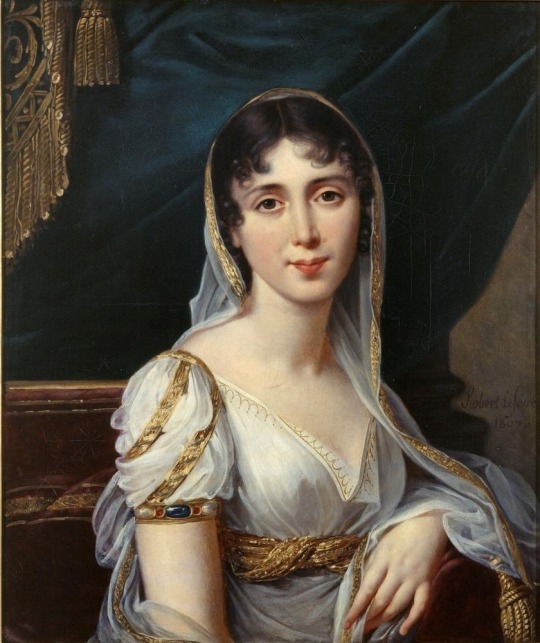
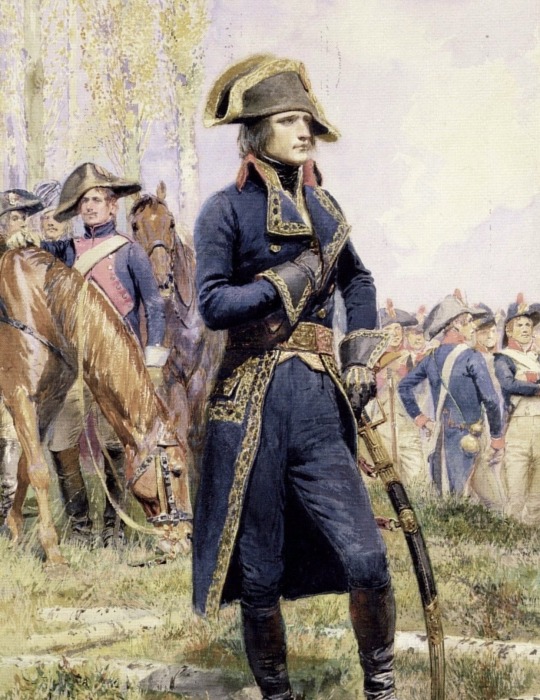
Excerpt from Désirée Clary’s letter to Napoleon Bonaparte while they were engaged:
“The thought of you is with me always, and will follow me to my grave. […] Our hearts are much too closely united for it ever to be possible for them to separate.”
The engagement did not work out, and they never married. When Désirée found out Napoleon had gotten together with Josephine, who he did marry, she wrote to him:
“You have made me miserable for the rest of my life, and yet I still have the heart to forgive you. My life is a horrible torture for me since I can no longer devote it to you.... You, Married! I cannot accustom myself to the idea, it is killing me, I cannot survive it.”
Source: Napoleon: A Life, by Adam Zamoyski
#napoleon#Désirée#Josephine#napoleon bonaparte#Désirée clary#josephine bonaparte#Napoelon and Désirée#Napoleon and josephine#1790s#1700s#18th century#history#napoleonic#napoleonic era#france#Sweden#quote#quotes#letter#letters#love#romance#reference#source
63 notes
·
View notes
Photo

“Writing a personal letter to the Kimh was a breach of protocol, and the response, from the foreign secretary Lord Grenville, was haughty. Addressed to his counterpart Talleyrand rather than to Napoleon Bonaparte, [the letter] accused France of ten years of aggression and clear that since Britain did not recognize the present authorities in France as legitimate, it would only negotiate with the restored Bourbons. Napoleon Bonaparte’s response, delivered by Tallyrand, rejected the charge of the aggression and challenged Grenville’s attitude to the French government, given that every other state in Europe had recognized the Republic and Britain itself had conducted negotiations with it only two years before. ‘Every nation had the right to choose its rulers,’ he went on, pointing out that the House of Hanover itself reigned in Britain thanks to a revolution. The point was picked up in the House of Commons by member of the opposition who asked Prime Minister William Pitt what he would say if a victorious France were to declare that she would only negotiate with the Stuarts.” - Adam Zamoyski, chapter twenty one, Marengo, page 276 of “Napoleon: A Life” (at San Francisco, California) https://www.instagram.com/p/CU5rnlPBGoi/?utm_medium=tumblr
0 notes
Photo

Napoleon: A Life, Adam Zamoyski
[Indie bookstores|Amazon|Audible]
0 notes
Quote
The work requires little comment. It is a psychoanalyst's feast with its display of emotional immaturity, dreams of glory, and sense of superiority combined with a desperate awareness of inferiority in some areas, with aggression coupled to a curiously mawkish sensibility, and total self-obsession
Adam Zamoyski, Napoleon A Life, discussing Napoleon’s novel ‘Clisson et Eugénie’
0 notes
Text
Meet the Bonapartes: Pauline (2/3)
(Part 1 is here.)
***
Pauline reluctantly traveled to Saint Domingue with her husband; unbeknownst to her, also sailing to Saint Domingue on another ship in the same convoy, was none other than Stanislaus Fréron, on his way to take up the position of Vice-Consul. He would ultimately die of yellow fever there in July of 1802.
Saint Domingue would be Pauline Bonaparte's crucible, and her experiences there would mark her character for the rest of her life. A carefree and frivolous young woman prior to this journey, Pauline settled into the role of a commander's wife, and did her best to make the most of an increasingly dreadful and volatile situation. Overcoming an illness that struck her shortly after her arrival, she worked to maintain the ever-sinking morale of the French soldiers and local civilians by hosting balls and fêtes, creating an escapist atmosphere as close to that of a Parisian "court" as possible. She accompanied Leclerc all over Saint Domingue, including to the fighting. When yellow fever struck, she helped to care for the sick. Leclerc wrote to Napoleon:
Madame Leclerc and my child are well. Considering how cruel it is for her to remain in a country where she has before her eyes only the sight of the dead and dying, I urged her to return to France, but under no circumstances would she consent to do so, telling me that she must follow my fortunes, good or ill. Her presence here is very pleasant for me.
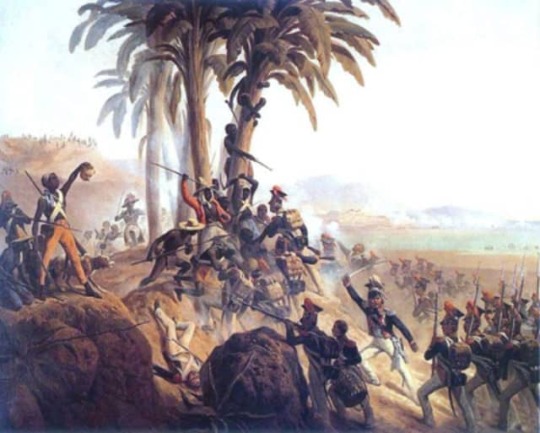
Napoleon was effusive in his praise for his sister's conduct during this trial. He wrote to her in July:
I have learned with such pleasure of how bravely you have borne the hardships that go with the manoeuvres of war. Take care of your husband, who I have learned is rather ill. Don't do anything to make him jealous. For a man under pressure, even the smallest thing can be intolerable. A wife needs to be accommodating at such times.... Your husband now really is worthy of being called my brother for the glory he has won... Stay united in love and tender friendship. My wife will send you the latest fashions.
During the siege of Cape Hatien, Pauline repeatedly refused Leclerc's orders to depart via a nearby ship. He went so far as ordering his men to carry her there in a sedan chair; but the siege had been lifted by the time the soldiers carrying out this charge reached the beach, and Pauline insisted on returning to Leclerc.
Her husband was soon gravely ill with yellow fever. Pauline tended him day and night, risking infection herself. Leclerc died on 2 November 1802; his last orders to his men were to ensure that Pauline and Dermide were returned to France.
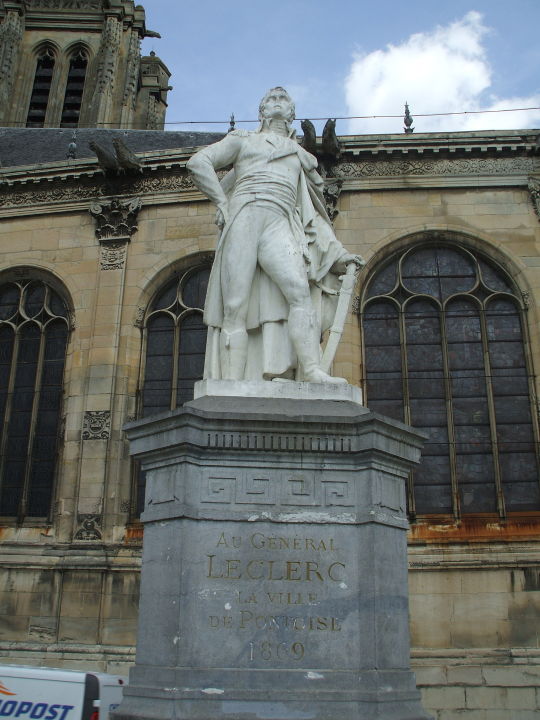
Pauline cut her hair short in mourning, and remained in her cabin for the duration of the voyage. Grieving and in ill health, she stayed with Joseph for a time upon her return to Paris. Along with the after-effects of her first pregnancy, the illness she contracted in Saint Domingue would likewise trouble her throughout her life. Predictably, this gave rise to many tawdry speculations about the illness being sexual in nature; in reality, it was most likely either a nervous eczema, or a tropical fever.
It is impossible to know the true extent to which Pauline's experiences on Saint Domingue, and the premature death of the husband with whom she had shared those experiences, had on her psychologically. Broers describes her lifestyle in the aftermath of Saint Domingue as a descent into "morbid decadence," and other historians tend to share the view that, after this traumatic period, Pauline gave herself over to a self-centered hedonism. Her ruinous spending habits came to mirror those of Josephine, and were likely just as pathological. And while never losing the warmth and tenderness for those she loved, she became capable of astonishing frigidity towards others; upon being told one day of a former lover having a leg blown off in Spain, Pauline coldly remarked that it was a shame, as he had been a good dancer. Napoleon, undoubtedly aware of these changes to his favorite sister's personality--and perhaps feeling a touch of guilt--may have grumbled over Pauline's conduct from time to time, but remained indulgent towards her to an extent that he never was with either Elisa or Caroline.
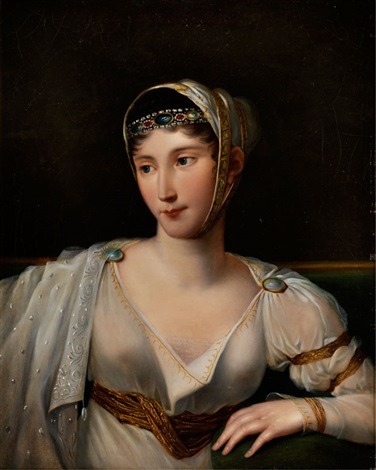
Sources:
Broers, Michael. Napoleon: Soldier of Destiny. 2014.
Cronin, Vincent. Napoleon Bonaparte: An Intimate Biography. 1972.
Fleischmann, Hector. Pauline Bonaparte and Her Lovers, 1914.
Fraser, Flora. Venus of Empire: The Life of Pauline Bonaparte, 2009.
Roberts, Andrews. Napoleon: A Life. 2014.
Weiner, Margery. The Parvenue Princesses: Elisa, Pauline, and Caroline Bonaparte. 1964.
Zamoyski, Adam. Napoleon: A Life. 2018.
#Meet the Bonapartes#Pauline Bonaparte#Napoleon#Napoleon Bonaparte#Charles-Victor-Emmanuel Leclerc#Saint Domingue#history#19th century
31 notes
·
View notes